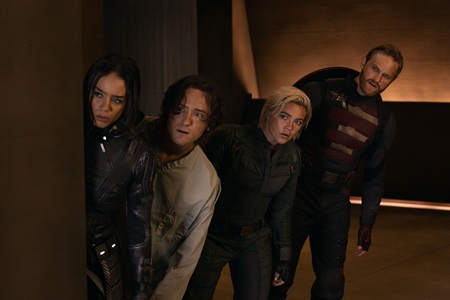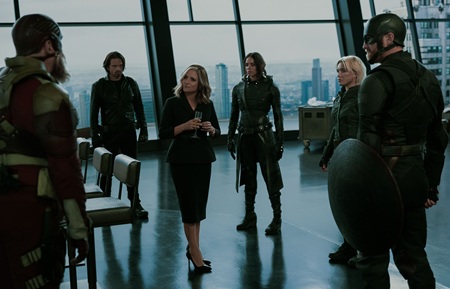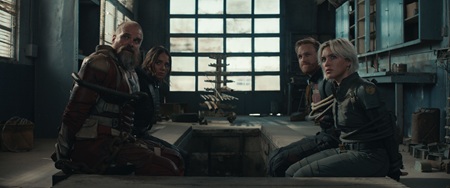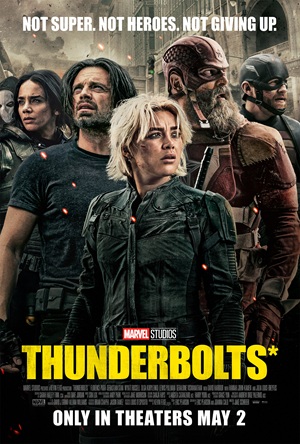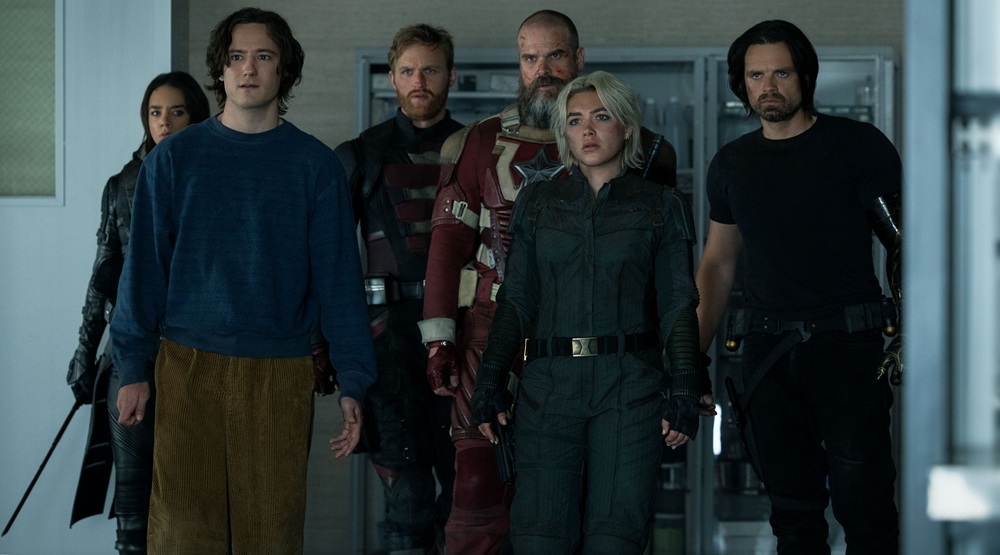
Marvel’s Traumatic Thunderbolts* is a Super-Powered Group Therapy Session
The best thing about the latest installment in the Marvel Cinematic Universe (MCU) Thunderbolts* is how unconcerned it is about being a story about comic book superheroes (or, in this case, antiheroes). The second-best thing is the performance of Florence Pugh, returning to the franchise as Red Room-trained assassin Yelena Belova after first introducing the character — the estranged adoptive sister of the late Natasha Romanoff — in 2021’s Black Widow and subsequently making a memorable appearance in the Disney+ series Hawkeye.
There are other items here that help make the film worthwhile, not the least of which is the understated direction by Jake Schreier (Robot & Frank), a notable reliance upon practical sets and effects, and a character-driven approach that allows the talented ensemble to mostly shine. Finally, bucking the MCU tradition of hyperbolic finales that overwhelm the senses in an onslaught of computer-generated trickery, the climax is surprisingly intimate and fascinatingly quiet, and the daring-do has more to do with mercy, understanding, and dealing with internalized trauma than it does about throwing a super-powered punch.
As nice as this may be, the feature still doesn’t come without a few hiccups. Even though this story is, more or less, pleasantly self-contained, it does assume that audiences have been following the MCU in hard-core detail for quite some time. While it is possible to figure out who all the characters are and what makes them important, key developments for each are oftentimes taken for granted.
What haunts them, why are they broken, what makes them lost, lonely souls searching for a reason to go on? Precious little of that is explored, mainly because other stories (both in theaters and on television) have already done that work. Problem is, for those who have not absorbed all of that material and done their homework before sitting down to watch Thunderbolts*, this shorthand isn’t only annoying, but at inopportune times it can be downright frustrating.
Events pick up with Yelena continuing to work undercover missions for the secretive Valentina Allegra de Fontaine (Julia Louis-Dreyfus), even though this murderous grind is starting to take its toll on her. What she does not know is that Valentina is forced to destroy any trace of the covert actions she’s ordered over the years, and that includes the existence of all the agents who have ever worked black ops for her. Yelena has been double-crossed alongside disgraced super soldier John Walker (Wyatt Russell), Red Room mimic Antonia “Taskmaster” Dreykov (Olga Kurylenko), and quantum-powered Ava “Ghost” Starr (Hannah John-Kamen), each marked for death by their cutthroat boss.
What happens next are a series of close escapes as the survivors, led by Yelena and assisted by her gregarious father Alexei “The Red Guardian” Shostakov (David Harbour) and the former Winter Soldier (now an elected member of the U.S. House of Representatives) Bucky Barnes (Sebastian Stan), are forced to figure out what it is that’s so gosh darn important that Valentina would want them killed. They are joined by the mysterious Bob (Lewis Pullman), a depressed down-on-his-luck everyman and former addict with almost no memory as to what makes him special enough to be amongst this gaggle of dysfunctional (and lethal) reprobates.
The idea of “found family” isn’t all that new as far as the MCU goes. The Guardians of the Galaxy trilogy, Eternals, and The Marvels all deal with this concept in one way or another. This entry in the series is laser-focused on this idea as well, centered on a group of disparate outcasts who need one another more than they initially realize.
But this story is built on a foundation of depression, trauma, and mental health. Yelena is undeniably the primary cog in this machine, but each character also has a past overflowing in pain, missed opportunities, and regret, and how they all deal with that as individuals and as a collective is what Schreier and his creative team are most interested in. While the action scenes are efficiently crisp and admirably unfussy (showcasing impressively choreographed stunt work), the psychological aspects are what I found most engaging.
This is readily apparent during the film’s final act. A new, potentially unstoppable force has risen and has embraced its power to send anyone and everyone into a place of misery known only as “The Void.” Yelena and her compatriots must put their own issues behind them, reconcile with the interior darkness that keeps them weak, and learn how to work as a single unit if they hope to keep New York City from plunging into eternal darkness.
It’s a daring way to bring things to a conclusion. While danger lurks around every corner and while each surviving hero does get to showcase their individual power, the focus is on they’re attempting to ease another soul’s pain, even if it is only for a brief, cathartically healing moment. They must learn to love again and, in doing so, also learn to accept their own shortcoming while forgiving themselves for past mistakes that have cut them off from everyone and anyone they come into contact with (including friends and family) on a regular basis.
This allows Thunderbolts* to rise above its more recent MCU brethren, and while never ascending to the heights of say Guardians of the Galaxy Vol. 3 or Black Panther, this is still an enjoyable, sometimes even thought-provoking adventure fans will almost certainly enjoy. While hardly profound, this latest bit of Marvel mayhem offers up vital food for thought. Even if only one person takes its messaging of forgiveness, empathy, and catharsis to heart, that’s more than enough to call this comic book endeavor a rousing success.
Film Rating: 3 (out of 4)


